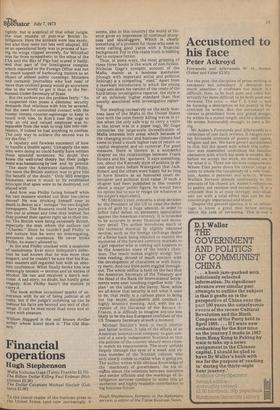Financial operations
nugh Stephenson Mafia Nicholas Gage (Talmy Franklin £2.70) The Billion Dollar Killing Paul Erdman (Hutchinson £2,20)
The Dollar Covenant Michael Sinclair (Gollancz C1.90)
To the casual reader of the business press in the United States (and now increasingly, it seems, also in this country) the world of finance gives an impression of continual sharpness and skulduggery. Which is clearly something of a problem for those who seek to write rattling good yarns with a financial background. For in this realm truth is bidding fair to outpace fiction. Thus, in some ways, the most gripping of these three books is the work of non-fiction. Nicholas Gage's synoptic account of the Mafia, mainly as a business institution (though with important social and political linkings) is a compelling "read." Apart from a mawkish introduction in which the young Gage sets down his version of the credo of the hard-bitten investigative reporter, the style is of an infinitely higher standard than that usually associated with investigative reporting. Not dwelling excessively on the early business base of the Mafia in the United States (nor with the inter-family killing waves in cities when the only safe way to carry a violin in the street was in a paper bag), Mr Gage chronicles the large-scale diversification of Mafia interests into areas which because of the changing social and business climate had come to yield a much higher rate of return on capital employed and on turnover. For good measure, there is thrown in a wonderful chapter on the relationships between Frank Sinatra and his ' sponsors.' It says something, too, about the Kennedy style of politics (a de cade and more before Watergate) that Jack, Robert and the others were happy for so long
to have Sinatra as an honoured court en tertainer and political fund raiser. If such a chapter had been published in this country
about a major public figure, he would have no option but to sue or resign (or whatever is the singer's equivalent). Mr Erdman's yarn concerns a snap decision by the President of the US to raise the dollar price of gold by a huge amount, in order to inflict total defeat on persistent speculation against the American currency. It is intended to be accurate in every financial and monetary detail. The author introduces much of the technical material by slightly laboured devices, such as the foreign exchange dealer of a Swiss bank being required to explain the mysteries of the forward currency markets to a girl reporter who is visiting and happens to be the American niece of the bank's chairman. The result makes slightly stodgy bedtime reading, devoid of much concern with the development of characters or with literary merit. And one little point niggled throughout. The whole edifice is built on the fact that the American Secretary of the Treasury and the Head of the Bank for International Settlements were seen lunching together with the plan' on the table at the Savoy. Now, while we all know that security is not what it used to be, that really is a curious place to bring out top secret documents and conduct a highly sensitive meeting. And, with the exception of the Governor of the Banque de France, it is difficult to imagine anyone less likely to be the key European confidant of the US Treasury Secretary at such a moment. Michael Sinclair's book is much shorter and better written. It tells of the efforts of an American international company to gain control of a newly independent Scotland so that the policies of the country should more closely match its requirements. The story unfolds largely through the eyes of a weak and obtuse member of the Scottish cabinet, who only slowly comes to realise what is going on. The author writes with obvious knowledge of the machinery of government,' for his insights about the relations between ministers and senior officials and the workings of intelligence services combine to make this an authentic and highly readable contribution to big business fiction.
Hugh Stephenson, formerly in the diplomatic service, is editor of the Times Business News.












































 Previous page
Previous page